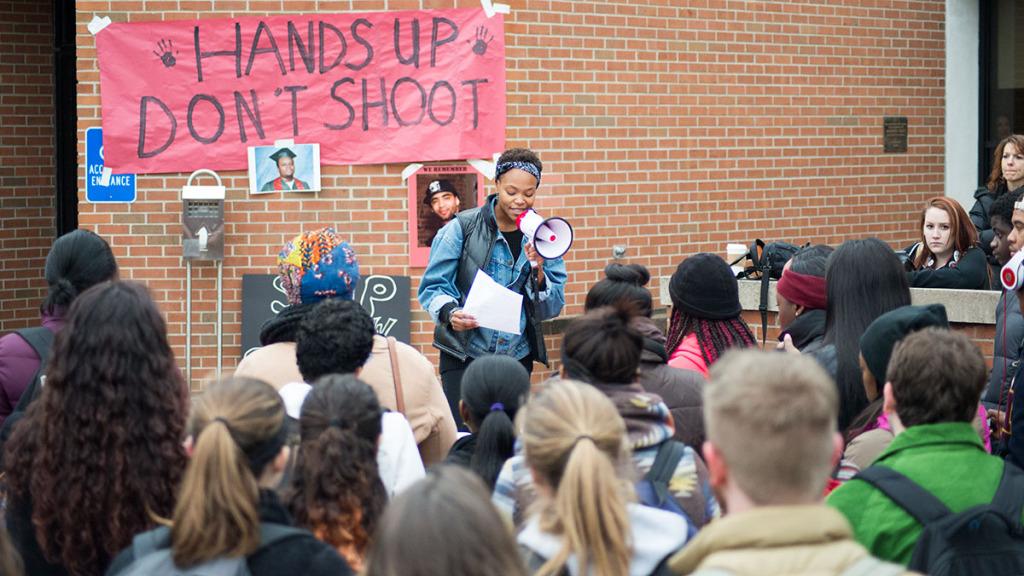A grand jury’s decision not to press charges against Officer Darren Wilson in the Aug. 9 shooting death of unarmed black teen Michael Brown in Ferguson, Missouri, has led to rallies and protests across the country. In solidarity with other walk-outs around the nation on Dec. 1, over 200 Ithaca College students attended a student-organized “Hands Up Walk Out” rally at Free Speech Rock outside of Campus Center.
Students and faculty attended the rally, in which student speakers shared their stories and feelings about police brutality, structural violence and racism. The rally was based on the ruling in Ferguson as well as the 43 missing student activists from Iguala, Mexico, who were arrested by local police and then handed over to a major drug cartel. Students walked out of their classes at 1:01 p.m., in accordance with 12:01 p.m. central time, when Brown was shot, to rally for two hours despite the cold temperatures.
Sophomore Dillon Randolph, one of the 10 student organizers of the event, said he was impressed with the amount of speakers and the authenticity of the event.
“It was astounding,” he said. “It exceeded my expectation. It was very heart-warming even out there in the 30-degree weather.”
In between personal speeches by students, students chanted “Hands Up, Don’t Shoot;” “No Justice, No Peace;” and a South African Xhoso and Zulu protest chant which translates to “Power to the People.” Signs at the rally referenced Shawn Greenwood, a black Ithaca man who was killed by police, and the phrase, “Stop the New Jim Crow.”
Kayla Young, a senior and another organizer of the event, said the rally provided students a chance to communicate their feelings about issues of race, police brutality and the events in Ferguson.
“Those are students who have held that in all semester long, looking for a place to grieve,” she said. “It was really powerful to hear from a lot of those students who were just honest.”
The event started with a moment of silence for victims of police brutality and structural violence, and included chants, poetry and sharing from both organizers and attendees.
Crystal Kayiza, president of the Student Government Association, was another organizer of the event and said during the rally that students should take the spirit of the rally into their everyday lives.
“We have to continue this conversation,” she said.
To continue the conversation, the organizers of the rally scheduled a meeting to discuss student activism at Ithaca College. The meeting will be held from 7–9 p.m. Dec. 3 in Williams 225, and according to the Facebook invite about the meeting, it will discuss both direct and indirect forms of resistance. The event is being organized by JUICE, a student group which is against police militarization.
Steven Kobby Lartey, a senior and another organizer, said the organizers plan to continue the discussion into the future.
“It’s about how we are going to increase understanding and trust on campus,” he said. “That’s the first step. It’s not about protesting, we’re not protesting. We’re making ourselves visible, as the structure of violence makes people invisible.”
Rita Bunatal, a junior who attended the rally, said she was happy to see so many people share their stories. She said although social media activism is helpful, she wished more students attended the rally.
“I would like to see more Ithaca students come out to these events,” she said. “There’s so much more than social media activism. These events do happen.”
Organizer Luna Gallegos, a sophomore, spoke about the passion of the missing Mexican student activists, asking the crowd what they have to lose by speaking out.
Lartey responded to this question.
“We have nothing to lose but the chains of oppression and injustice,” he said.
Many speakers shared their perspectives on racial issues. International students spoke about police and the military presence in their countries, while many other students shared personal encounters with discrimination and their own fears about how police brutality could affect them. Other speakers spoke against the sense of complacency they feel is prevalent on this campus in regards to racial issues and said they wished more students had joined the discussion.
Young said the issues discussed relate to all students on campus.
“This is about making the campus better for all of us, it’s not about only a certain group,” she said. “It’s about wanting to have a holistic, real experience.”








